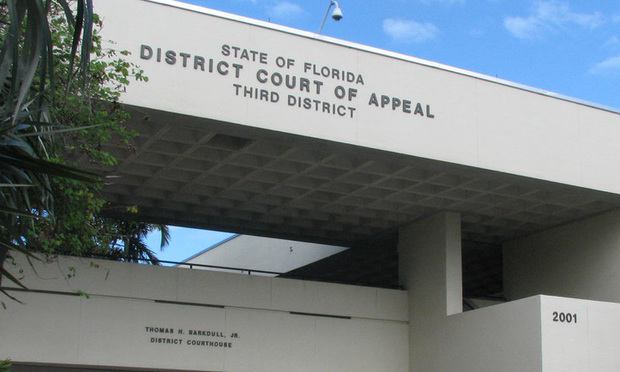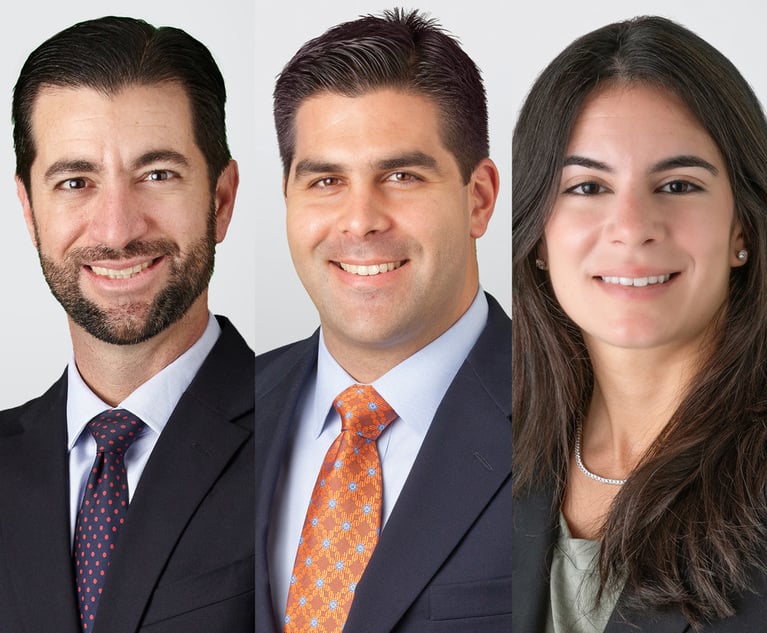Miami Attorneys Win Jurisdictional Row Over $2.7 Million Bank Account
Florida's Third District Court of Appeal ruled that a Miami-Dade trial court erred in its decision to deny a Brazilian bank representative's motion to dismiss a fraud complaint in a case that hinged on forum selection.
October 19, 2018 at 04:55 PM
3 minute read
 Third District Court of Appeal at 2001 SW 117th Ave., in Miami. Photo: J. Albert Diaz/ALM
Third District Court of Appeal at 2001 SW 117th Ave., in Miami. Photo: J. Albert Diaz/ALM
A ruling by the Third District Court of Appeal has pushed a dispute over $2.7 million in allegedly misplaced funds out of the Miami-Dade Circuit Court and into a venue slightly more southward — Brazil.
In March 2013 Hamed Wardak, an Afghani investor who had previously been the subject of scrutiny for his role in transporting U.S. military vehicles through Afghanistan, opened a multimillion-dollar Miami account with Brazil-based bank and financial services firm Estrategia Investimentos. Wardak filed suit in Florida against the bank and the employee who handled his account, Pablo Antoniazzi, alleging that he could not access his funds.
But Antoniazzi filed a motion to dismiss the breach of contract and fraud complaint against him and his employer, claiming that the contract Wardak signed precluded the possibility of litigation in Miami. He failed on that motion before Miami-Dade Circuit Judge William L. Thomas.
But in an opinion issued Wednesday, the appellate court sided with the defendants, reversing Thomas, and finding the case should be adjudicated in Brazil. It agreed with the defense that the contract's forum selection clause was “mandatory and unambiguous” — rather than ”permissive” — and that any legal action must take place in Brazil.
Additionally, the appellate court saw fit to crack open a dictionary to answer the question of “whether the phrase 'branch of the Bank' is ambiguous or unambiguous” enough to make the case that “Miami-Dade County was a proper forum because the Bank had an 'office' in Miami.”
Read the opinion:
Citing Black's Law Dictionary, the Third DCA distinguished between a “branch bank” and “branch office” by defining a “branch bank” as “at very least … any place for receiving deposits or paying checks or lending money apart from chartered premises.”
“No evidence was presented that the Miami office was a location at which deposits were received, checks paid, or funds withdrawn,” according to the opinion. “Indeed, the affirmative testimony established that the Miami office did not have an ATM machine or a teller. There was no evidence that appellees ever deposited or withdrew any funds at the Miami office, or that such could be done at the Miami office.”
The appellate court therefore concluded “the Miami office does not fall within the ordinary meaning of the term 'branch of the Bank.' ”
Andrés Rivero, counsel for Antoniazzi and partner at Miami firm Rivero Mestre, told the Daily Business Review that “ the court's reasoning tracked exactly with what we were arguing,” and that he and the firm were “very pleased with the result.”
Rivero Mestre attorney Maria Paula Aguila argued the case before the appellate court.
Wardak's attorney, Alexis Fields of Kopelowitz Ostrow Ferguson Weiselberg Gilbert, did not respond to requests for comment by press time.
Related stories:
'Scream These Facts': Miami-Dade Attorneys Trade Barbs in $11.4 Billion Bitcoin Lawsuit
Rivero Mestre Team Gets 2 Settlements for Hepatitis C Insurance Coverage
This content has been archived. It is available through our partners, LexisNexis® and Bloomberg Law.
To view this content, please continue to their sites.
Not a Lexis Subscriber?
Subscribe Now
Not a Bloomberg Law Subscriber?
Subscribe Now
NOT FOR REPRINT
© 2025 ALM Global, LLC, All Rights Reserved. Request academic re-use from www.copyright.com. All other uses, submit a request to [email protected]. For more information visit Asset & Logo Licensing.
You Might Like
View All
Trump Mulls Big Changes to Banking Regulation, Unsettling the Industry


Shareholders Sue Arc Global for Wrongful Withholding of Trump Media Shares
3 minute read
Greenberg Traurig Initiates String of Suits Following JPMorgan Chase's 'Infinite Money Glitch'
Trending Stories
- 1Arguing Class Actions: With Friends Like These...
- 2How Some Elite Law Firms Are Growing Equity Partner Ranks Faster Than Others
- 3Fried Frank Partner Leaves for Paul Hastings to Start Tech Transactions Practice
- 4Stradley Ronon Welcomes Insurance Team From Mintz
- 5Weil Adds Acting Director of SEC Enforcement, Continuing Government Hiring Streak
Who Got The Work
J. Brugh Lower of Gibbons has entered an appearance for industrial equipment supplier Devco Corporation in a pending trademark infringement lawsuit. The suit, accusing the defendant of selling knock-off Graco products, was filed Dec. 18 in New Jersey District Court by Rivkin Radler on behalf of Graco Inc. and Graco Minnesota. The case, assigned to U.S. District Judge Zahid N. Quraishi, is 3:24-cv-11294, Graco Inc. et al v. Devco Corporation.
Who Got The Work
Rebecca Maller-Stein and Kent A. Yalowitz of Arnold & Porter Kaye Scholer have entered their appearances for Hanaco Venture Capital and its executives, Lior Prosor and David Frankel, in a pending securities lawsuit. The action, filed on Dec. 24 in New York Southern District Court by Zell, Aron & Co. on behalf of Goldeneye Advisors, accuses the defendants of negligently and fraudulently managing the plaintiff's $1 million investment. The case, assigned to U.S. District Judge Vernon S. Broderick, is 1:24-cv-09918, Goldeneye Advisors, LLC v. Hanaco Venture Capital, Ltd. et al.
Who Got The Work
Attorneys from A&O Shearman has stepped in as defense counsel for Toronto-Dominion Bank and other defendants in a pending securities class action. The suit, filed Dec. 11 in New York Southern District Court by Bleichmar Fonti & Auld, accuses the defendants of concealing the bank's 'pervasive' deficiencies in regards to its compliance with the Bank Secrecy Act and the quality of its anti-money laundering controls. The case, assigned to U.S. District Judge Arun Subramanian, is 1:24-cv-09445, Gonzalez v. The Toronto-Dominion Bank et al.
Who Got The Work
Crown Castle International, a Pennsylvania company providing shared communications infrastructure, has turned to Luke D. Wolf of Gordon Rees Scully Mansukhani to fend off a pending breach-of-contract lawsuit. The court action, filed Nov. 25 in Michigan Eastern District Court by Hooper Hathaway PC on behalf of The Town Residences LLC, accuses Crown Castle of failing to transfer approximately $30,000 in utility payments from T-Mobile in breach of a roof-top lease and assignment agreement. The case, assigned to U.S. District Judge Susan K. Declercq, is 2:24-cv-13131, The Town Residences LLC v. T-Mobile US, Inc. et al.
Who Got The Work
Wilfred P. Coronato and Daniel M. Schwartz of McCarter & English have stepped in as defense counsel to Electrolux Home Products Inc. in a pending product liability lawsuit. The court action, filed Nov. 26 in New York Eastern District Court by Poulos Lopiccolo PC and Nagel Rice LLP on behalf of David Stern, alleges that the defendant's refrigerators’ drawers and shelving repeatedly break and fall apart within months after purchase. The case, assigned to U.S. District Judge Joan M. Azrack, is 2:24-cv-08204, Stern v. Electrolux Home Products, Inc.
Featured Firms
Law Offices of Gary Martin Hays & Associates, P.C.
(470) 294-1674
Law Offices of Mark E. Salomone
(857) 444-6468
Smith & Hassler
(713) 739-1250






